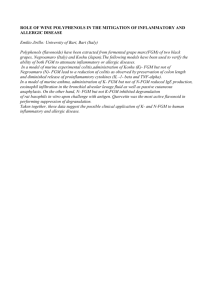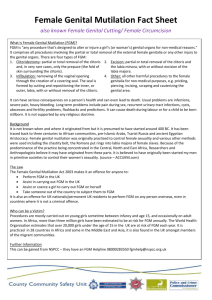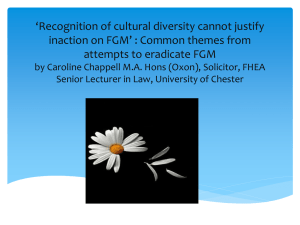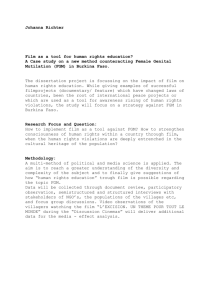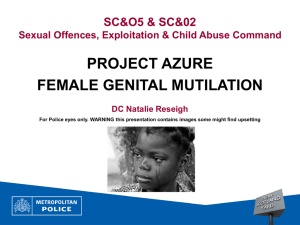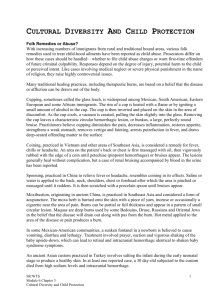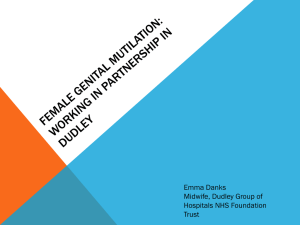Home Office Circular 10/2004 - London Safeguarding Children Board
advertisement
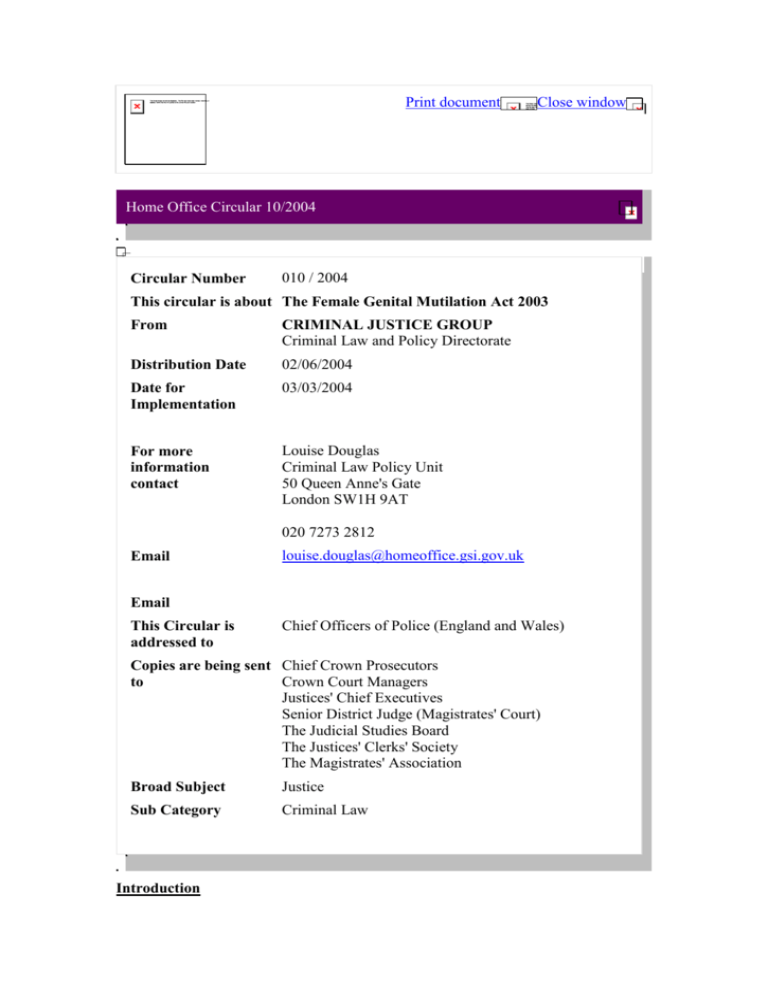
Print document Close window Home Office Circular 10/2004 Circular Number 010 / 2004 This circular is about The Female Genital Mutilation Act 2003 From CRIMINAL JUSTICE GROUP Criminal Law and Policy Directorate Distribution Date 02/06/2004 Date for Implementation 03/03/2004 For more information contact Louise Douglas Criminal Law Policy Unit 50 Queen Anne's Gate London SW1H 9AT 020 7273 2812 Email louise.douglas@homeoffice.gsi.gov.uk Email This Circular is addressed to Chief Officers of Police (England and Wales) Copies are being sent Chief Crown Prosecutors Crown Court Managers to Justices' Chief Executives Senior District Judge (Magistrates' Court) The Judicial Studies Board The Justices' Clerks' Society The Magistrates' Association Broad Subject Justice Sub Category Criminal Law Introduction This Act will be brought into force on 3 March 2004 by the Female Genital Mutilation Act 2003 (Commencement) Order 2004. The purpose of this Circular is to provide guidance to those working in the criminal justice system on its provisions. This Circular is for guidance only and should not be regarded as providing legal advice. Legal advice should be sought if there is any doubt as to the application or interpretation of the legislation. 2. The Female Genital Mutilation Act 2003 repeals and re-enacts the Prohibition of Female Circumcision Act 1985. It makes it an offence for the first time for UK nationals or permanent UK residents to carry out female genital mutilation (FGM) abroad, or to aid, abet, counsel or procure the carrying out of FGM abroad, even in countries where the practice is legal. To reflect the serious harm that FGM causes, the Act also increases the maximum penalty from 5 to 14 years' imprisonment. Details of the Act can be found on http://www.hmso.gov.uk/acts/acts2003/20030031.htm. 3. The provisions of this Act will apply only to offences committed on or after the date of commencement. For offences committed before 3 March 2004, the Prohibition of Female Circumcision Act 1985 will apply as appropriate. This Circular should in particular be brought to the attention of officers working in Child Protection Units in areas of the country where there are communities which are known to practice female genital mutilation (see paragraph 22 below). It should be read in conjunction with Home Office Circular 44/2003 about the duties and powers of the police under the Children Act 1989. 4. This circular is in three parts: A A brief summary of the provisions of the Act B Issues relevant to the investigation of offences under the Act C Background to and context for the legislation Its terms have been agreed with ACPO. A The provisions of the 2003 Act 5. Section 1 of the Act makes it an offence for a person to excise, infibulate or otherwise mutilate the whole or any part of a girl's external genitalia. (Although the Act refers throughout to a "girl", because most victims will be girls, section 6 provides that "girl" includes "woman".) By virtue of section 8 of the Accessories and Abettors Act 1861, it is also an offence for a person to aid, abet counsel or procure the commission of this offence. 6. In strict anatomical terms, there is little to distinguish some of the procedures involved in carrying out FGM from those involved in carrying out legitimate surgery. The Act therefore provides an exception for surgical operations that are necessary for a girl's physical or mental health and operations carried out in connection with childbirth. But the exception applies only if the operation is carried out: in the UK by a registered medical practitioner or registered midwife or a person training to be one ; or outside the UK by overseas equivalents of such persons. 7. In assessing a girl's mental health no account is taken of any belief that the operation is needed as a matter of custom or ritual. So an FGM operation could not legally occur on the ground that a girl's mental health would suffer if she did not conform with the prevailing custom of her community. 8. It is not an offence for a girl to mutilate her own genitalia but section 2 of the Act makes it an offence for another person to aid, abet, counsel or procure her to do so. 9. Section 3 of the Act makes it an offence for a person in the UK to aid, abet, counsel or procure the performance outside the UK of FGM that is carried out by a person who is not a UK national or permanent UK resident. This offence only applies where the victim of FGM is a UK national or permanent UK resident. So the person who, for example, arranges by telephone from his home in England for his UK national daughter to have an FGM operation carried out abroad by a foreign national (who does not live permanently in the UK) is guilty of an offence. 10. The exception for necessary surgical operations that applies for the purposes of section 1 of the Act also applies to section 3. 11. Section 4 of the Act extends sections 1, 2 and 3 so that any of the prohibited acts done outside the UK by a UK national or permanent UK resident will be an offence under domestic law and triable in the courts of England and Wales and Northern Ireland. (The Act does not extend to Scotland. The 1985 Act did extend to Scotland and will continue to apply there.) 12. The effect of the extension of section 1 is that it is an offence for a UK national or permanent UK resident to carry out FGM outside the UK. By virtue of section 8 of the Accessories and Abettors Act 1861, it is also an offence for: a person in the UK; or a UK national or permanent UK resident outside the UK to aid, abet, counsel or procure a UK national or permanent UK resident to carry out FGM outside the UK. For example, if a person in the UK advises his UK national brother over the telephone how to carry out an FGM operation abroad, he is guilty of an offence. 13. The effect of the extension of section 2 is that it is an offence for a UK national or permanent UK resident outside the UK to aid, abet, counsel or procure a person of any nationality to carry out FGM on herself wherever the procedure is carried out. 14. The effect of the extension of section 3 is that it is an offence for a UK national or permanent UK resident outside the UK to aid, abet, counsel or procure a foreign national (who is not a permanent UK resident) to carry out FGM outside the UK on a UK national or permanent UK resident. For example, a permanent UK resident who takes his permanent UK resident daughter to the doctor's surgery in another country so that FGM can be carried out is guilty of an offence. 15. Section 5 of the Act provides that a person convicted of an offence under the Act is liable: on conviction on indictment, to a maximum of 14 years' imprisonment or a fine or both; and on summary conviction, to a maximum of 6 months' imprisonment, or a fine not exceeding the statutory maximum, or both. 16. Offences under the Act are arrestable under the provisions of the Police and Criminal Evidence Act 1984 by virtue of the maximum penalty of 14 years' imprisonment and/or an unlimited fine. The maximum sentence reflects the seriousness with which the offence should be regarded. B Issues relevant to investigation of offences 17. Offences of FGM should be investigated in accordance with the procedures set out in the Government-issued guidance Working Together to Safeguard Children. The ACPO/NCPE Child Protection Manual, which is expected to be available from April 2004, will provide further guidance to the Police Service of England and Wales. However, it should be borne in mind that FGM differs from other forms of child abuse in two important respects: despite the very severe health consequences, parents and others who have this done to their children genuinely believe that it is in the child's best interest to conform with their prevailing custom. They believe it makes the child socially acceptable and do not intend it as an act of abuse; and there is no element of repetition - it is a one-off act of abuse (although younger female siblings of any child found to have been mutilated may be at risk). 18. These factors are relevant not just in investigating suspected cases of FGM, but in trying to prevent it from happening. Where a family has been identified as at risk, it may not be appropriate to consider removing the child from an otherwise loving family environment. But consideration should be given to steps such as getting a prohibited steps order making it clear to the family that they will be contravening the law if they arrange for their daughter to have the procedure. It is not acceptable to leave such cases uninvestigated, as this sends the message to the community that the activity is acceptable and will not be punished even if it is against the law. Internationally, efforts are being made to eradicate the practice completely. These efforts must be complemented by action in the UK, and the Act is designed to help achieve this. 19. FGM is deeply steeped in the culture of the practising communities who may resent what they perceive as the imposition of liberal western values on them. But FGM is not a matter which we can leave to be decided by personal preference or culture and custom. It is an extremely harmful practice which violates the most basic human rights which the UK has undertaken to protect in a number of international instruments, in particular the UN Convention on the Rights of the Child and the Convention on the Elimination of Discrimination Against Women. Officers should not be reluctant to investigate alleged offences of FGM for fear of being considered racist. C Background to and context for the legislation 20. Female genital mutilation (FGM) involves procedures which include the partial or total removal of the external female genital organs for cultural or other nontherapeutic reasons. The practice is medically unnecessary, extremely painful and has serious health consequences, both at the time when the mutilation is carried out, and in later life. It can also be psychologically damaging. The procedure is typically performed on girls aged between 4 and 13, but in some cases FGM is performed on new born infants or on young women prior to marriage or pregnancy. Many of the victims are therefore young and vulnerable. A number of girls die as a direct result of the procedure, from blood loss or infection. In the longer term, women who have undergone some form of FGM are twice as likely to die in childbirth, and four times more likely to give birth to a stillborn child. 21. There are no cultural or traditional reasons why the practice should be accepted. It is not a religious practice and the leaders of all major religions have condemned the practice as unnecessary and harmful. But any action which is being contemplated must be proportionate and sensitive to the cultural norms and pressures on parents and children. Action should be taken in close collaboration with other members of the Area Child Protection Committee. 22. FGM is much more common than most people realise, both worldwide and in the UK. Most of the women and girls affected live in Africa, although some live in the Middle East and Asia. However, those who have undergone, or are at risk of undergoing, FGM are increasingly found in Western Europe and other developed countries, primarily among immigrant and refugee communities. It is estimated that there are around 74,000 women in the UK who have undergone the procedure, and about 7,000 girls under 16 who are at risk. This estimate is based on the number of immigrants and refugees settled in the UK from countries where FGM is endemic. There are substantial populations from these countries in London, Liverpool, Birmingham, Sheffield and Cardiff but FGM is not necessarily confined to these areas. 23. FGM has been a specific criminal offence in the UK since 1985 when the Prohibition of Female Circumcision Act 1985 was passed. But we know that in some communities, within the UK as well as abroad, the practice is still accepted or even condoned. In particular, the fact that people can circumvent the 1985 Act by taking young girls abroad to carry out FGM has been seen for some time as a loophole in the law. It is this loophole that the 2003 Act is intended to help close. This Document has been published from Microsoft Word
